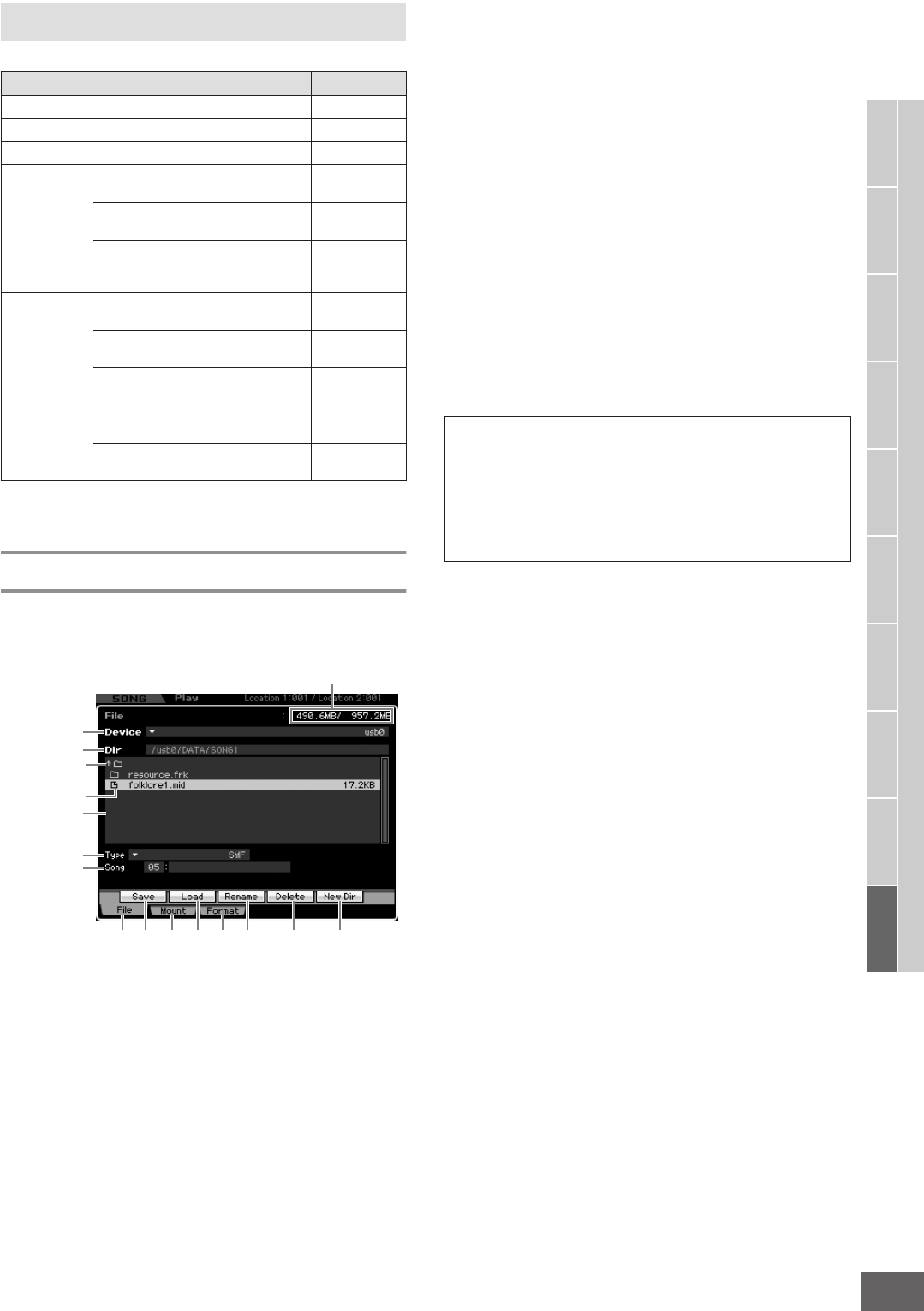
Voice mode
Song mode
Pattern mode
Mixing mode
Master mode
Utility mode
File mode
Performance
mode
Sampling
mode 1
Sampling
mode 2
Reference
File Management (File mode)
MOTIF XS Owner’s Manual
275
File Management—[F1] File
The File window lets you use all file-related functions such
as device selection, selecting a path, save, load, rename
and delete.
1 Device
Here, you can select the desired device from the ones
mounted (recognized) by the File mode. The device
selected here is called “Current Device.” When selecting a
device, the root directory of the selected device appears in
the Dir column. The amount of used memory and total
memory on the selected device appears at the top right of
the display.
n You can call up the list by pressing the [SF6] LIST button then
select the desired item from the list. For details, see page 82.
2 Dir (Directory)
Indicates the current directory with the path. The contents
(files and folders) included in the current directory are
listed in the Directory/File list box below. The current
directory can be changed in the Directory/File list box
below.
3 Directory/File list
Indicates the directories and files in the current Directory.
In this box, the directories and files are listed in
alphabetical order, with the exception of the top line which
is provided for moving to the next highest directory. You
can distinguish the directory and file by the indicator at left
end of each line.
D ..... Directory (Folder)
F ...... File
The directory name is shown on the Directory line while the
file name with the extension and file size are shown on the
File line.
4 Type
Determines the data type to be saved or loaded. The
available type differs depending on the mode selected
before calling up the File mode. For details about the data
types, see pages 273 and 274. You can call up the File
Type List by pressing the [SF6] LIST button then select the
desired one from the list. For details, see page 82.
5 Memory location of the data type above
Determines the memory location of the data type above
such as Voice Bank/number, Performance Bank/Number,
Song number and Pattern number. The available values
differ depending on the Type setting above. For details
about the source memory to be saved, see page 278. For
details about the target memory to be loaded, see
page 280.
6 [SF1] Save
Pressing this button executes the Save operation. For
detailed instructions on saving, see page 278.
7 [SF2] Load
Pressing this button executes the Load operation. For
detailed instructions on loading, see page 280.
File Type Setting example when saving:
Data to be saved File type
All data All
User Voice All Voice
Performance All
Songs When User Voices are used in the
Songs:
All
When no User Voices are used in
any of the Songs:
All Song
When you wish to transfer a Song to
an external MIDI sequencer or
computer:
SMF
Pattern When User Voices are used in the
Patterns:
All
When User Voices are not used in
all the Patterns:
All Pattern
When you wish to transfer a Pattern
to an external MIDI sequencer or
computer:
SMF
Sampling
data
All waveforms All Waveform
When you wish to transfer a Sample
to a computer:
WAV, AIFF
1
6!@#789)
4
3
5
2
The amount of used memory/total memory
To upper level
File
Moving between the directory levels
To go down from the current directory, move the cursor to
the desired directory in the Directory/File list then press
the [ENTER] button. To go up from the current directory,
move the cursor to the top line in the Directory/File list
then press the [ENTER] button.


















